2012.09.30 CoStone Capital 浏览次数:
The fourth CoStone Capital Management Forum and the Launch Ceremony of the Wuhu Navigation CoStone Fund commenced on September 15. The Wuhu Navigation CoStone Fund, with a scale of over ¥600m (approx. $91.8m), is the tenth fund launched by CoStone Capital and invests in the growing SMEs. This forum focuses on the topics concerned by entrepreneurs and the investment industry, such as the macro economy, the micromanagement of enterprises and social science.
The fourth CoStone Capital Management Forum and the Launch Ceremony of the Wuhu Navigation CoStone Fund commenced on September 15. The Wuhu Navigation CoStone Fund, with a scale of over ¥600m (approx. $91.8m), is the tenth fund launched by CoStone Capital and invests in the growing SMEs. This forum focuses on the topics concerned by entrepreneurs and the investment industry, such as the macro economy, the micromanagement of enterprises and social science.
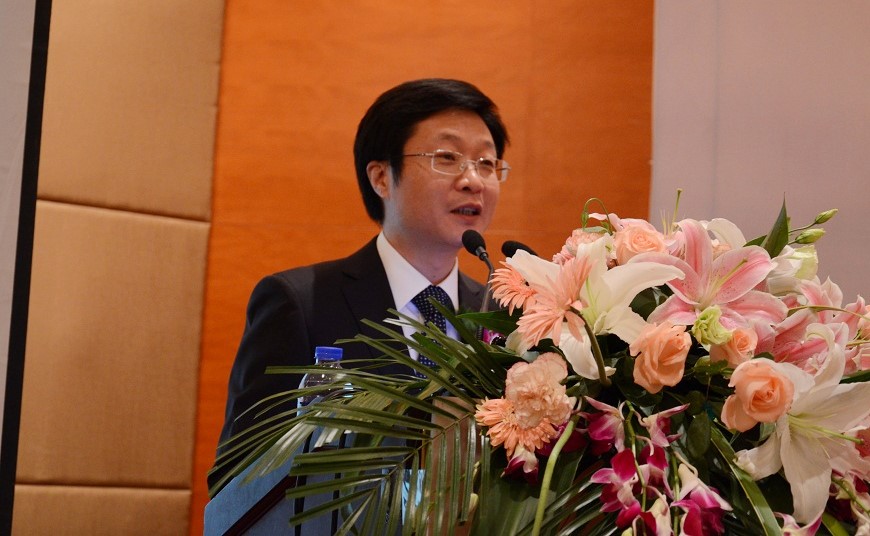
Pan Chaohui, Deputy Secretary of the Wuhu CPC Party Committee, making a speech
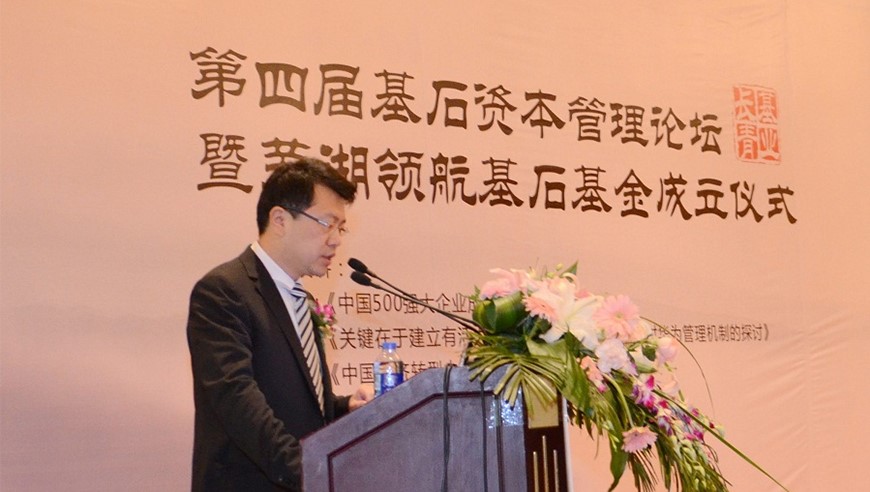
Lin Ling, CoStone Capital Partner and Manager of the Navigation CoStone Fund, introducing the fund
The launch of the Wuhu Navigation CoStone Fund was welcome among investors, although many of them were gloomy about the investment environment. Chairman Zhan Wei expressed his optimism about the environment at the fund's launch ceremony. Most of the projects that have brought high returns to CoStone Capital were invested when the macro economy was predicted to be weak and there was a decline in the capital market, said Zhang Wei.

Ha Jiming making a speech
Ha Jiming, an economist and Managing Director of Goldman Sachs Asia, corroborated Zhang Wei's opinion at the CoStone Capital Management Forum on September 15. From his analysis of the global economic trend, the upgrading of the consumption structure, the economic transformation and the aging population will fuel emerging industries in the long run. Furthermore, the valuation of the stock market is expected to go up in the fourth quarter because of an improving political environment.
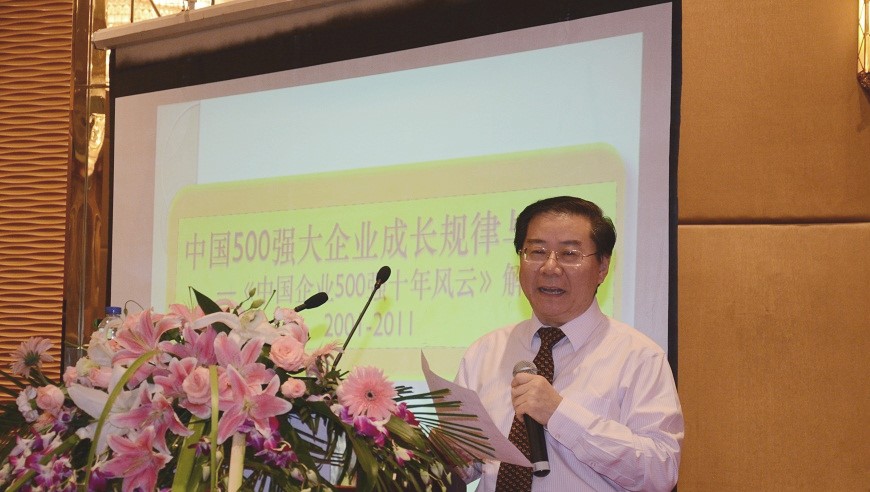
Prof. Yang Du on the Growth and Model of China's Top 500 Enterprises
Professor Yang Du at Renmin University of China lectured on the "Growth and Model of China's Top 500 Enterprises". The topic was illustrated with credible charts and figures in a critical way.
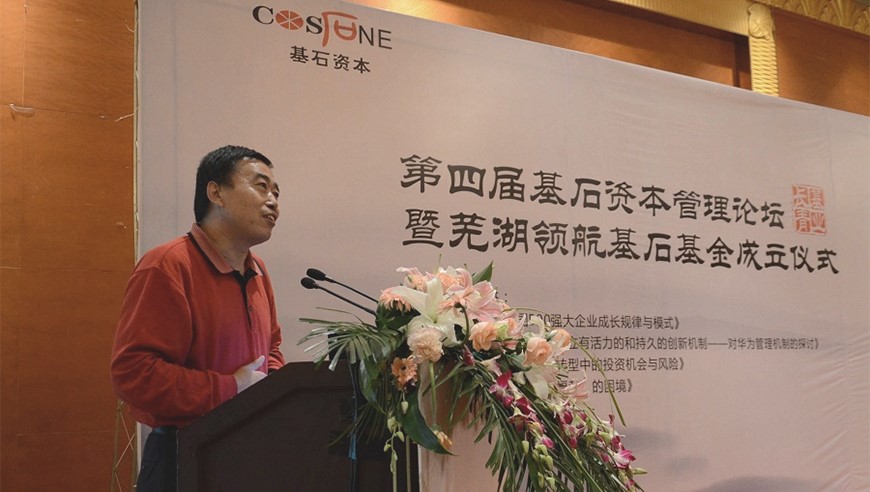
Prof. Wu Chunbo on Huawei's Culture
Professor Wu Chunbo enjoys a high reputation for his study on Huwwei's culture. As he introduced, the core of Huawei's management consists of three aspects: a performance-oriented corporate culture, a customer-oriented macro business model, and a process-oriented operation mode. Putting customers at the center is the basic culture of Huawei and the most sustainable mode of development, Prof. Wu finally added.
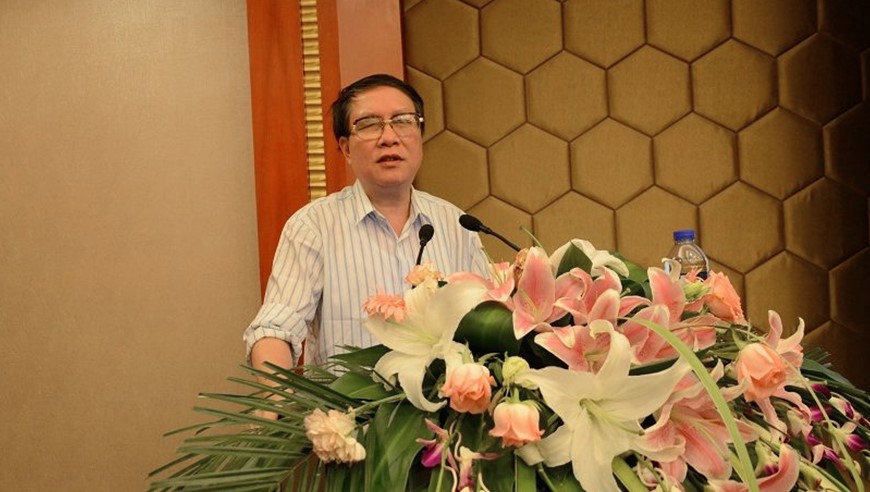
Prof. Qin Hui on Social Management
Professor Qin Hui at Tsinghua University discussed how to get out of the trap of "Negative Welfare" in his speech. He reckoned that the negative welfare problem in China is caused by "robbing the poor to feed the rich". To solve the problem, the system must be reformed. He stressed that welfare must be deemed as the citizens' right and the government's responsibility, and that the accountability system for the government should be strengthened.
Speaker
Dr. Ha Jiling
Dr. Ha Jiming is Vice Chairman and Chief Investment Strategist of the Investment Strategy Group within the Investment Management Division of Goldman Sachs Asia, focusing on macroeconomic research in China. He joined Goldman Sachs in Investment Banking Services as a managing director in 2010. Prior to joining Goldman Sachs, Dr. Ha was Chief Economist at China International Capital Corporation from 2004 to 2010. Before that, he was a senior economist at the International Monetary Fund from 1993 to 2004. He worked at the Hong Kong Monetary Authority within the IMF from 2001 to 2003 and served as the IMF resident representative to Indonesia from 1999 to 2001.
Prof. Yang Du
Yang Du is Professor and PhD Supervisor at Renmin Business School. He earned his PhD in Economics from Renmin University of China (RUC) and another PhD in Business Administration from Kobe University. He did his post-doctoral work in Management at RUC and has been teaching there since 1994. He served as Director of the Department of Business Management, Director of the Department of Theories of Management, and Director of the Department of Organization and Human Resources. His research studies the firm growing theory, knowledge management, corporate culture and enterprise ethics.
Prof. Wu Chunbo
Prof. Wu Chunbo is a leading expert at China Stone Management Consulting Group, and Professor and PhD supervisor at RUC. He also served as Dean of the Institute of Organization and Human Resources, School of Public Administration, RUC. He has published over 100 articles in journals at home and abroad and translated more than 10 foreign works. His representative works include Grasp the Future: The Planning of Modern Business Operation, Organization Design and Operation, A Course of Cases in Human Resource Management and Get out of Chaos. Prof. Wu provided design and consulting services of HR management for a dozen Chinses enterprises and organizations. As one of the drafters of the Huawei Basic Law, he has been serving as a senior corporate management advisor to Huawei since 1995.
Prof. Qin Hui
Qin Hui, a historian and economist, is Professor at the Chinese University of Hong Kong. Graduating from Lanzhou University in 1981, he is now a visiting research fellow at the Fairbank Center for Chinese Studies, Harvard University, a visiting scholar at the Harvard-Yenching Institute, Member of the Council of the China Economic History Society, and a special research fellow at the Unirule Institute of Economics. Prof. Qin used to teach history at the Department of Human and Social Sciences, Tsinghua University. His main research interests are economic history and Chinese agrarian history, with the representative work of Modernization Beyond Government and Enterprise: A Comparative Study on the History of Chinese and Western Public Welfare.
Rewritten by Jiang Xiaomei, Edited by Li Yunzhen, Du Zhixin, Wei Yiyi
几年前,我曾提出一个问题:中国经济繁荣的根基是什么?
我认为是“重商主义(这里借指市场经济)”与“儒家文化”这两个因素的核聚变,只要我们的体制大门开一条小小的缝,中国老百姓与生俱来的聪明、勤奋、奋不顾身,几千年穷怕了的物质主义和实用主义,就能创造一个新天地。
2021年,我见到一个新能源公司的董事长,谈及张维迎所言“直到20世纪70年代,绝大部分中国人的生活水平不比唐宋时期好多少”,他说这是真的,1978年他没有见过电,全家所有家当是一个小木柜。1979年,我的好朋友,一个咨询集团的董事长考上了大学,报到前他勤工俭学,骑六七十里山路卖冰棍,山里的一户人家,用几个鸡蛋和他换了一根,全家人排成一排每个人吮吸一囗。
在改革开放前,这是中国普遍的景象。而我们这一两代人,在改革开放后,怀抱着对美好生活的向往,创造了人类发展史上的奇迹。40多年过去,我们看到,轻舟已过万重山。伟大的中国工业革命,怎么赞扬也不为过!
而另一方面,中国用几十年的时间,走完了发达国家几百年的路,这也就注定了,我们上山的道路,更加的陡峭。同时,中国作为一个有几千年历史的古国,其发展正常就是“孔雀东南飞,五里一徘徊”。作为一个新兴经济体,我们讲究的是实用主义,中国的政策也是因时、因势而变的。
因此,并非一些简单的因素就能够遏制中国的增长,只要不出现战争这样会扰乱经济进程的极端因素,只要中国依然坚定地支持民营经济发展,保护企业家精神,中国经济的前进步伐就是坚定不移的。
如果认同这一点,那么无论是短期的政策、市场变化还是长期的中美对抗,都不会让我们产生太大的焦虑。
具体从我们做企业和做投资来讲,也无需过度悲观。“沉舟侧畔千帆过,病树前头万木春”,在一些行业和企业衰落的同时,也永远有一些行业和企业在崛起。
以半导体产业为例,我们不必纠结于半导体仿佛一年紧缺、一年过剩,因为问题的核心不是这个。问题的核心是第四次工业革命离不开半导体技术,而中美对峙、科技封锁,将进一步迫使中国在所有科技领域谋求自主可控,进一步迫使中国以举国体制解决创新问题。同时,当一项投资吻合科技进步趋势和政策引导的双重影响时,其估值亦将脱离传统财务模型。这些才是中国硬科技投资的重要的底层逻辑。
看待资本市场,我们更不必计较一时的股价波动。回顾历史,在资本市场发生剧烈调整时,那些优质的企业往往也会出现大幅下跌,但不同的是,优秀企业不仅能收复失地,还能再攀高峰。因此,我们继续坚定地布局那些有核心技术、有企业家精神的企业。而从我们的投资经历来看,那些有企业家精神的企业最终都带领我们穿越了周期,并获得了异乎寻常的回报。
莫愁前路无知己,天下谁人不识君!